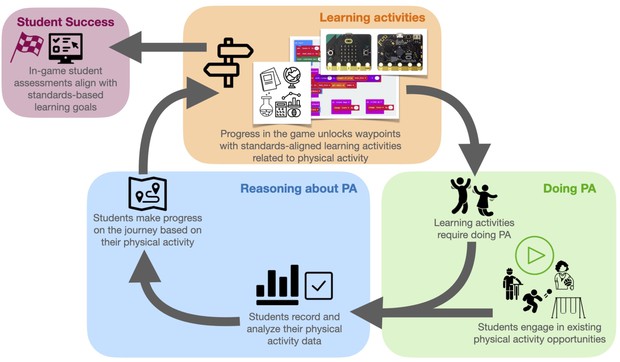Project SMART
Project SMART directly and simultaneously seeks to address declining rates of childhood physical activity and to support contextualized computer science and computation thinking (CS/CT) education within the elementary school classroom. The basis of Project SMART is a cooperative educational game that has been adapted to use CS/CT to provide not only learning opportunities but also a focus on the health and educational benefits of physical activity, leveraging organized physical activity opportunities during the school day.
The project relies on community based participatory research to create a researcher-practitioner partnership that includes university researchers in health education and computer science, elementary school administrators and teachers, and K-12 computer science education experts. The combination of physical activity and CS/CT learning in the elementary school classroom is an important novel contribution of this work. There currently exists little emphasis on improving computational thinking in elementary curricula. Computer science pathways that do exist often fail to engage student populations that are traditionally underserved.
Project moveSMART uses a web-based platform to integrate opportunities for physical education with computer science and computational thinking (CS/CT) learning activities. Within the platform, a class cooperatively earns credit for performing physical activity like participating in physical education class or playing outside at recess. This credit takes the form of distances traveled on a virtual path (e.g., along Route 66 across the United States). As the class makes progress, they unlock waypoints that contain CS/CT learning modules as well as additional learning activities directly tied to the required school curriculum. Within the platform, we have developed a series of tutorials designed to introduce elementary students to CS/CT by making connections to physical activity and grade-level curricula in other subjects. Through these tutorials, students create a physical activity monitor using the BBC micro:bit.
Through our work in Project SMART, which also includes professional development sessions for elementary school teachers, we have surfaced multiple challenges that include pressures for all instruction to adhere to required standards, a lack of contextualization of CS/CT content, and unreliable at-home Internet that makes it difficult to reinforce lessons outside of school. By tying CS/CT to students’ own physical activity, we address the dual problems of declining physical activity in children and a lack of contextualization of CS/CT content. To further address identified barriers, we co-designed game elements with classroom teachers to enable cross-curricular connections, including connecting CS/CT to language arts, cultural studies, music, etc.

Project Participants: Dr. Christine Julien (MPC director), Dr. Darla Castelli (collaborator at The University of Texas at Austin), Dr. Jamie Payton (collaborator at Temple University)
Publications:
- Connor Fritz, Dylan Bray, Grace Lee, Christine Julien, Sheri Burson, Darla Castelli, Carol Ramsey, Jamie Payton. "Project moveSMART: When Physical Education Meets Computational Thinking in Elementary Classrooms," Computer. 2022.
- Yeonhak Jung, Sheri Burson, Christine Julien, Dylan Bray, Darla Castelli. "Development of a School-Based Physical Activity Intervention Using an Integrated Approach: Project SMART," Frontiers in Psychology. 2021.
- Christine Julien, Darla Castelli, Dylan Bray, Sangsu (Seth) Lee, Sheri Burson, Yeonhak Jung. "Project SMART: A Cooperative Educational Game to Increase Physical Activity in Elementary Schools," Smart Health. 2020.
- Colin Maxfield, Christine Julien, Mohit Tiwari. "Improving Child Health through Technology-SupportedActive Transport: A Survey of Parent Perspectives," Proceedings of the International Conference on Pervasive Computing Technologies for Healthcare. 2019.
- Matteo Saloni, Christine Julien, Amy L. Murphy, Gian Pietro Picco. "LASSO: A Device-to-Device Group Monitoring Service for Smart Cities," Proceedings of the IEEE International Smart Cities Conference (ISC2). 2017.
- Colin Maxfield, Christine Julien. "Data-Directed Contextual Relevance in the IoT," Proceedings of the International Conference on Software Engineering. 2017.